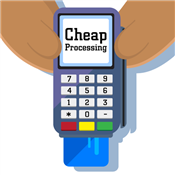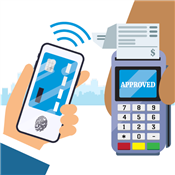How to Negotiate Lower Credit Card Processing Fees
Credit card processing fees eat away at your profits. Learn the best ways to negotiate credit card processing fees to lower your cost.
 |
| © CreditDonkey |
1. Know Which Fees Are Negotiable?
First, you need to know which fees are open to discussion. Here's what your total processing fees are made up of:
- Interchange fees (non-negotiable): These fees are paid to the card issuing banks to cover operation costs and risk. They are set by the credit card associations and can't be changed.
- Assessment fees (non-negotiable): These are paid to the card networks (Visa, Mastercard, Discover, Amex) for using their card brands. They're also non-negotiable.
- Processor markup fees (negotiable): These include your processing provider's commission for each transaction. Plus any service fees you're paying, like monthly fee, payment gateway fee, PCI compliance fee, etc.
These are the only fees that can be negotiated, since your provider has control over them.
2. Get a Better Pricing Model
It's important to get the right kind of pricing plan for your business. As your business grows, you may have outgrown your provider. Another one may offer a better pricing model with lower rates.
Credit card processing companies have 4 main pricing models. Here's a quick summary:
- Flat rate
You pay a flat percentage for every transaction. Square is a common example of flat rate credit card processor. This is good for new or small businesses. But if you're processing more than $5k/mo, Interchange-Plus will save you more. - Interchange Plus
This model is the most transparent. The processor's markup is clearly stated. Typically, the markup consists of a percentage and a flat per-transaction fee (ex. Interchange + 0.2% + $0.10). Helcim is an example of Interchange Plus provider.Credit card networks like Visa, Mastercard, and Discover determine the interchange fees and charge a small assessment fee as well. These fees are non-negotiable. But the "plus"—the markup the processor charges—IS negotiable. - Subscription
This is best for high volume businesses processing around $15k/mo or more. You pay a monthly membership fee for the service. Stax offers this type of pricing. - Tiered pricing
This pricing model is the least transparent. You're charged different rates based on the type of card used. The interchange and markup fees are blended together so you can't tell what the processor is charging. If you're on this plan, you definitely want to switch.
Typically, only the Interchange-Plus and Subscription models are negotiable. In these models, the processor markup is clearly separated, so it's easy to negotiate that rate.
3. Look for Interchange Plus Quotes
To compare plans, you need to be able to separate the fees. This is only possible with interchange-plus or subscription pricing plan.
You may see interchange plus pricing plan written like so: Interchange + 0.2% + $0.10 per transaction. The 0.2% + $0.10 is the processor markup. This is what you want to negotiate.
With interchange plus quotes from each processor, you can easily see who has the lowest markup. But remember, some processors charge a monthly or other service fees, so you can't just look at the markup rate. We'll talk more about it below.
While interchange rates aren't negotiable, you may be able to convince a processor to lower its markup—the rate they charge. This is especially true if a competing business is willing to offer a lower rate.
4. Know the Effective Rate
Before you start negotiating, you need to know your effective rate. This is the rate after adding in all your processing costs, including:
- Interchange fees
- Assessment fees
- Processor markup
- Other fees like monthly fee, payment gateway fee, PCI compliance fee, etc.
This is the true percentage you're paying for every credit card transaction. Knowing this number will let you know whether your processing costs are too high, and if there's room for negotiation.
Look at your past monthly statement. You will need two numbers: the total processing fee charged and total amount processed. Then use the calculator below to get your effective rate.
You can also calculate it yourself using the formula: (total processing fees / total sales volume) x 100.
A fair effective rate is 2.5% to 3.25%. If your rate is more than 3.5%, then your processor provider markup is likely too high. It'll be in your best interest to negotiate or switch providers.
Ideally, 70-80% of your processing fees should be the interchange fees (which are non-negotiable). Your provider fees should be no more than 20% of your total processing costs. Keep that goal in mind when negotiating.
Say your processor charges:
- Interchange + 0.2% + $0.10 per transaction
- A monthly fee of $10
- $10 virtual terminal fee
Say you have monthly credit card sales of $15,000 with an average sale of $150. That's 100 transactions per month. Let's say your average interchange rate is 1.81% and the assessment fees are 0.13%.
Your monthly processing fees are:
- Interchange fees: $15,000 x 1.81% = $271.5
- Assessment fees: $15,000 x 0.13% = $19.5
- Processor markup fees: ($150 x 0.2% + $0.10) x 100 = $40
- Monthly fees: $20
- Total monthly processing fees = $351
Effective rate = (Total Cost/Monthly Sales) x 100
($351/$15,000) x 100 = 2.34%
5. Negotiate the Processor Markup
So maybe you've found that your provider markup is too high. But what exactly do you negotiate? Here is the general rule of thumb:
- If your business has small average ticket size, negotiate the fixed fee.
For example, if your processing rate is Interchange + 0.2% + $0.15, getting it down to + 0.2% + $0.10 will save you 5 cents each purchase. That can add up to a lot of savings if you're processing thousands a month.
- If your business has large average ticket size, negotiate the percentage markup. For instance, you can cut it down to 0.15% + $0.15.
Say your average transaction size is $200. That will give you a savings of 10 cents each transaction. The larger the transactions, the bigger the savings.
6. Reduce the Monthly Fees
Besides just the provider markup for each transaction, also see if there are other service fees you can cut down. Make a detailed list of the fees the processor charges.
A few of the most common fees include:
- PCI compliance fees
- Payment gateway fees
- Virtual terminal fees
- Monthly or annual fees
- Fees for not reaching the monthly minimum
- Batch fees
- Statement fees
But there could be other junk fees that the provider charges. Ask to see the fine print and ask specific questions about any non-disclosed fees that could add to your expenses for each processor.
If you're looking to switch providers, you can try to negotiate some of these fees into your contract for free. For example, if your current provider includes PCI compliance for free, but the one you want to switch to doesn't, you can ask for that to be included.
7. Get Several Quotes
Try to get quotes in writing from at least three credit card processors with interchange plus pricing. Having some hard quotes will give you something to go off of. You can go to your preferred provider and ask to match the lowest rate.
But don't just look at the per-transaction markups. Also see what other services and features you may need and if they're included.
For example, do you need a payment gateway or virtual terminal? One provider may include those in their processing rate while another may charge separate monthly fees.
Once you know the big picture, you can decide among the processors. This is why it's important to compare the overall effective rate, instead of just individual rates.
8. Increase Your Negotiation Power
To have better success at negotiating, you need to prove that you're a valuable client. Providers are looking for clients that can make them money and carry very little risk.
The more sales you have, the more negotiation power. If your business now brings in more sales than when you first signed up, it's a good time for a chat.
Other ways to show that you're a valuable client include:
- If you have established business history
- If you have solid account standing
- If you good credit
- If you have very little chargebacks
- If you have your own equipment
Processing providers value good clients, so they're more willing to work with you to cut down fees.
9. Choose a Processor and Negotiate
Once you have all of the information, it's time to negotiate. Use the written quotes and your research to get the best possible deal. By understanding the terms and process, you'll have a better chance of securing favorable terms on a contract.
Don't forget to look at the cancellation policies. The ideal contract operates month-to-month. It shouldn't cost you anything to cancel should you decide the processor isn't right for you.
At the very least, negotiate an early termination fee waiver. This gives you the chance to cancel your contract early if the processor doesn't work out for you.
What the Experts Say
As part of our series on small businesses and entrepreneurship, CreditDonkey asked a panel of industry experts to answer readers' most pressing questions. Here's what they said:
Bottom Line
Negotiating your credit card processing fees will keep more profit in your pocket. Knowing the different terms and what processors charge can help you make an informed decision.
Shop around with different processors and make your decision carefully. Don't feel pressured to take the first "incredible deal" you're offered.
Instead, take your time and choose the processor that will provide what you need at the lowest effective rate possible.
Write to Kim P at feedback@creditdonkey.com. Follow us on Twitter and Facebook for our latest posts.
Note: This website is made possible through financial relationships with some of the products and services mentioned on this site. We may receive compensation if you shop through links in our content. You do not have to use our links, but you help support CreditDonkey if you do.
Not sure what is right for your business?
|
|
|
|
|
| ||||||
|
|
|
















